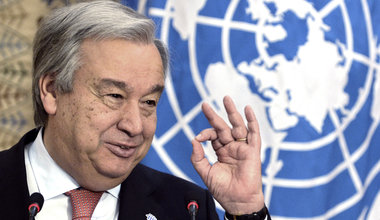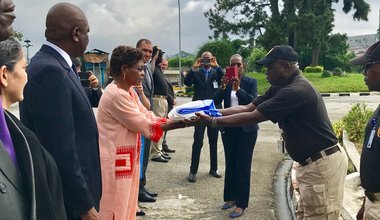Daily Brief on Cote d’Ivoire for Friday, 23 January 2009
Highlights
- UNOCI pledges support for " football for reconciliation and peace" competition
- Identification operation resumes in Daloa after protest by Young Patriots
Sports and peace
The Principal Deputy Special Representative of the UN Secretary-General for Cote d'Ivoire, Abou Moussa today met with Jacques Anouma, the Chairman of the Comité d'Organisation du Championnat d'Afrique des nations de football des locaux (CHAN) which has organised a football competition on the theme "Reconciliation" scheduled to take place between 22 February and 8 March 2009 in Abidjan and Bouaké. Mr. Anouma told the PDSRSG that his committee had come to ask for help with medical and security provisions for the event, "because UNOCI has given a lot of help to the Ivorian peace process and is an integral part of the Ivorian population". Mr. Moussa assured him that the Mission would provide whatever help it could in line with its mandate and resources. A joint working group is due to be set up in the near future to work out the modalities of UNOCI's support for the competition.
Electoral process
The identification and voter registration operation resumed in Daloa (centre-west) today after being suspended in the 55 centres across the city yesterday, following a protest by the Coordination des Jeunes Patriotes (COJEP),` during which they seized equipment from SAGEM, the technical operator for the process. They told UNOCI that they were protesting against the arbitrary replacement of some members of identification teams - a decision which they said they considered as an incitement to fraud. The equipment was later returned to SAGEM.
Security
Residents in Zagoreta, near Daloa (centre-west) told a UNOCI patrol that despite the presence of a gendarmerie post in their village, there were still frequent incidents of roadside banditry along most roads.
UNOCI Military Observers (Milobs) on 21 January 2009 witnessed an attack on three cars by armed individuals dressed in military uniforms, in Kekrekouakoukro, near Bouake. On noticing the Milobs, the assailants ran away with personal belongings stolen from some passengers.
Arms embargo
UNOCI peacekeepers yesterday successfully carried out arms embargo inspections at the National Armed Forces of Cote d'Ivoire's (FANCI) unit in Yamoussoukro and at its gendarmerie brigade in Abengourou (east).
Human Rights
The Regional Human Rights Office in Duekoué (west) is following up the case of a 14 year-old girl who was allegedly raped was raped by three youths in Man on 31 December 2008. The youths reportedly made her drink alcohol and then brought her to an uninhabited house where they repeatedly raped her. The victim was found unconscious on 1st January by some security guards. She received medical treatment in Man Hospital but is still in pain. Her family settled the case after one of the alleged perpetrators paid 4000 FCFA (approx $8) for her medical expenses.
In Bouaké, on 21 January 2009, the Regional Human Rights Office conducted a sensitization campaign against female genital mutilation (FGM), in collaboration with the local NGO "OIS-Afrique", and the local offices of UNICEF and the Ministry of Family, Women and Social Affairs in that city. Some 50 people, including community leaders and former practitioners of female genital mutilation (FGM) attended the session which highlighted the negative impact of FGM on the health of women and the legal provisions of the Ivorian Penal Code that punish this practice. Participants also recommended that NGOs pursue their efforts for the elimination of FGM and that sanctions be taken against practitioners.
The Regional Human Rights Office in Daloa (centre west) met with Ms Claudine Kangah, the Regional Director of the Ministry of Family, Women and Social Affairs, to discuss possible areas of partnership and cooperation at local level. Both parties agreed on a number of projects and programmes that aim at empowering women and girls as well as persons living with disabilities through capacity building activities; combating and preventing sexual violence and harmful traditional practices against women and girls; and increasing regional and local awareness on women's rights and dignity.
 ONU
ONU Nations Unies Maintien de la paix
Nations Unies Maintien de la paix




